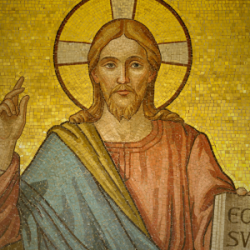Welcome readers! Please subscribe through the buttons on the right if you enjoy this post.

In both Matthew’s and Luke’s gospels we read these words that have been at the heart of Christianity’s anti-Semitic history:
“Therefore I am sending you prophets and sages and teachers. Some of them you will kill and crucify; others you will flog in your synagogues and pursue from town to town. And so upon you will come all the righteous blood that has been shed on earth, from the blood of righteous Abel to the blood of Zechariah son of Berekiah, whom you murdered between the temple and the altar. Truly I tell you, all this will come on this generation.” (Matthew 23:34-36)
“Because of this, God in his wisdom said, ‘I will send them prophets and apostles, some of whom they will kill and others they will persecute.’ Therefore this generation will be held responsible for the blood of all the prophets that has been shed since the beginning of the world, from the blood of Abel to the blood of Zechariah, who was killed between the altar and the sanctuary. Yes, I tell you, this generation will be held responsible for it all.” (Luke 11:49-51)
Context! Context! Context!
I cannot emphasize this enough. We must not remove these passages from their original political context. Christians have used this passage to repeatedly persecute, marginalize, and execute Jewish people. But Jesus was not a Christian. Jesus was a Jew standing firmly in the long line of Jewish prophets who pronounced judgments for societal and economic injustice on their generations. So before we go any further, we must see the Jewishness of these passages. They must first be read within the context of Judaism if they are to be held without harm by Christians. Once we do this, I believe we will see a universal truth here that will also enable us to rightly critique Christianity’s abuses of the marginalized and vulnerable.
We must also keep in mind that Matthew’s and Luke’s versions of this saying were both written after the catastrophic events that took place in their generation in Jerusalem. These are post-trauma writings designed to explain and understand what has just happened for the Jewish people.
I do not believe that the Romans destroyed Jerusalem because the Jews rejected Jesus as their Messiah. I believe that all human civilizations give themselves an expiration date when the elites’ abuses of the proletariat become the policy of the day. Jesus stood in solidarity with those being socially, politically and economically abused. Social abuse eventually catches up with us, and all empires that become characterized by exploitation and economic disparity eventually meet their demise. People long-abused rise up. Revolutions occur. Power shifts. The path toward this end for Jerusalem (which would later happen within Rome, as well) is what we are witnessing in this passage.
We know from Josephus that ultimately the lower, poorer classes in Judea and Galilee did rise up and violently revolt. First, they revolted against oppression from their own people and took over the elite’s centralized control of the temple. Then they revolted against Rome in the Jewish-Roman war. This overreach led to Rome’s inhumane backlash in the annihilation of Jerusalem.
In this passage, Jesus warns that if the people continue their socio-economic exploitative path, then just as the prophets had warned before him, that generation would see catastrophic results.
This passage connects us with the Hebrew economic prophets (e.g. Isaiah, Amos, Ezekiel, Jeremiah), who were rejected and in some cases murdered because of their societal critiques. Here in America, during the 1960s, we saw a similar history of repressing calls for change from those whose voices threatened the status quo and those in positions of power and privilege. Some historians refer to the 60s as the era of assassinations. Among those who were murdered were President John F. Kennedy (1963), el-Hajj Malik el-Shabazz (Malcolm X; 1965), and Dr. Martin Luther King, Jr. (1968).
Our world has a long history of removing those who threaten our societal structures and the exploitation and injustice that those structures enable. Jesus’ societal structure had its own victims, as ours does. His generation was once again rejecting the call to change, and Jesus was about to have his name added to the long list of those who weren’t afraid to name the oppressions of their time or stand in solidarity with those being marginalized and subjugated—even if they ended up losing their life for the dream of a world that is a safe, just, compassionate home for us all.
In the Hebrew scriptures, Abel is the first voice in the narratives to be silenced. He represented the nomadic class in the Mediterranean, Middle East, and Northern Africa. His social group was a minority: itinerant shepherd wanderers who moved from place to place as herdsmen. Cain, Abel’s brother, belonged to a larger, more established, and more powerful class of tillers of the soil. They represented those who sought to control land ownership because of their need to work the land. They were the ones who chased off vagabond herdsmen like Abel. In a time when civilization transitioned from wandering hunters and gatherers to more centralized, localized cities, the tillers of the ground were the pivotal population. Abel would have represented the people oppressed by the tillers of the ground, and at the end of this story, Cain is made to wander like his brother to learn what the wanderers’ life was like. His banishment gives him firsthand knowledge of what it’s like to walk a mile in the shoes of those whom the society was pressing down so that others might find a way up. (For more on this, see the article I wrote at the end of 2014 entitled No More Sacrifice.)
Thousands of years later, Zechariah is the last prophetic voice in the Hebrew Masoretic text to be silenced for speaking out against those in positions of power. (The Masoretic collection of Hebrew scriptures ends with 2 Chronicles; see 2 Chronicles 24:20) Zechariah’s history is complex and so is the political agenda of the narratives his name is mentioned in. For our saying this week, it’s enough to recognize that he was one of the bookends of those within Jewish history who had the courage to critique those in power.
In My Sister, My Brother; Womanist and Xodus God Talk by Karen Baker-Fletcher and Garth Kasimu Baker-Fletcher. Karen writes, “The only way to erase those who have died unjustly is to erase memory, but not even memory can be erased permanently” (p. 90). It is important to remember and never forget the names of those who have given their lives to the work of transforming our world into a safe, compassionate, just home for all. Author Susan Jacoby tells us that early 19th Century freethinkers observed the birthdays of freethinkers in the century before them as a ritual that shaped them and inspired them to continue the causes and dreams of those who had traveled that path before them. They remembered them together. Karen Baker-Fletcher, as a Christian womanist, reflects on Toni Morrison’s text Beloved and its characters’ belief that Jesus is the greatest “ancestor”:
“Whoever Beloved is, Stamp Paid observes that she is a reminder that people ‘who die bad won’t stay in the ground’ — not ‘Jesus Christ Himself.’ Reflecting African pre-Christian and African American Christian worldviews, he suggests Jesus is one of many who will not stay buried because they have died violently. Jesus is one of millions of persecuted ancestors who live in the margins of everyday consciousness. Moving beyond Morrison’s text, one might consider that the ground itself will not hold the blood of murder. Just as the earth cried out at Cain’s slaying of Abel, so it continues to cry out across the centuries against injustice. Christian womanists might argue that in the ancestral community of Moses, Zipporah, Jethro, Nat Turner, Harriet Tubman, and Sojourner Truth, Christ perfectly embodies the power of the God of Moses, ‘I Am,’ Being-Itself. Jesus Christ as the greatest of the ancestors sustains community.” (p. 91)
Keeping alive the memories of those who have died violently at the hands of unjust systems throughout scriptures and history, and remembering not just the Hebrew Prophets but also more contemporary figures and Jesus, too, can impact how we engage the ritual of communion.
Communion is a shared meal around an egalitarian table, not a hierarchical structure as is the case in too many churches today. It is not a social pyramid or exclusive circle, but a shared table where we keep alive the memory of those who have been broken and spilled out by unjust systems. This ritual motivates and shapes us today. The very elements of the broken bread and spilled wine, the food we share with one another could be reclaimed into a very powerful transforming ritual of memory.
Co-opting Memory
Also, I want to talk about co-opting memory. We recently addressed unjust systems that make memorials to those they have killed: making memorials is much easier than doing the hard work of actually transforming our world. There is a difference between us keeping alive the memory of those who have gone before us and the systems we seek to change co-opting the memory of those it has executed.
Vincent Harding’s book Martin Luther King: An Inconvenient Hero is a great read on how the United States has done this with the memory of Dr. Martin Luther King, Jr. Martin Luther King Day is complicated. On one side, we see the work of those such as Coretta Scott King to preserve Martin’s memory. On the other hand, we see the system King critiqued co-opting him while keeping the changes he called for at arms’ length.
During his life, King called for an abandonment of capitalism and a move toward a democratic socialism. He called for the rejection of militarism and violence as the weapons of a global economic capitalist agenda. He fought tirelessly against systemic racism in its many forms. The FBI deemed him to be the greatest domestic threat to America. And yet today he is one of America’s heroes. Not much has changed economically since the days of King’s critiques, and precious little has changed racially. Yet King is memorialized by a government that would still be voicing the loudest criticism of him if he were still alive.
I do believe King should be kept alive in our memory as one of our great transformative ancestors. I also believe that his memory has been co-opted by the very system he sought and failed to change. The next time social protest erupts, watch how quickly critics pull Dr. King off the shelf to try and silence those speaking out.
Martin Luther King Day has just been celebrated by the most violent, militaristic, and capitalist power on the globe and the wealth disparity between the rich and poor and between White people and people of color continues to grow steadily. Last week’s and this week’s saying give us much to consider today.
Evangelical Christianity Today
Lastly, I stated that his passage rightly understood would enable us to also rightly critique Christianity’s abuses of the marginalized and vulnerable. All communities, societies, and organizations give themselves an expiration date when those on the margins and those who are vulnerable are abused. We see this in the history of Christendom in Europe as well as people’s response to Evangelical Christianity here in America today. Again, Jesus stood in solidarity with those being socially, politically and economically abused. To the degree that Christians (especially White Christians who are presently still the sector of society with the most power and influence today) are responsible for the harm done to those on the margins of society, they have set their own expiration date. Even now, many feel that Evangelical Christianity in America is not a voice of compassion or justice, but is instead responsible for doing harm in our society. (See Evangelicals have abandoned their mission in favor of Trump, White evangelicals love Trump and aren’t confused about why. No one should be., Donald Trump: How the tycoon’s message of racism and hatred has struck a chord with Evangelical Americans, and The End of ‘Evangelical’)
What would it mean in our context today to hear Jesus saying those same words to Evangelicals today:
“This generation will be held responsible for it all.”













